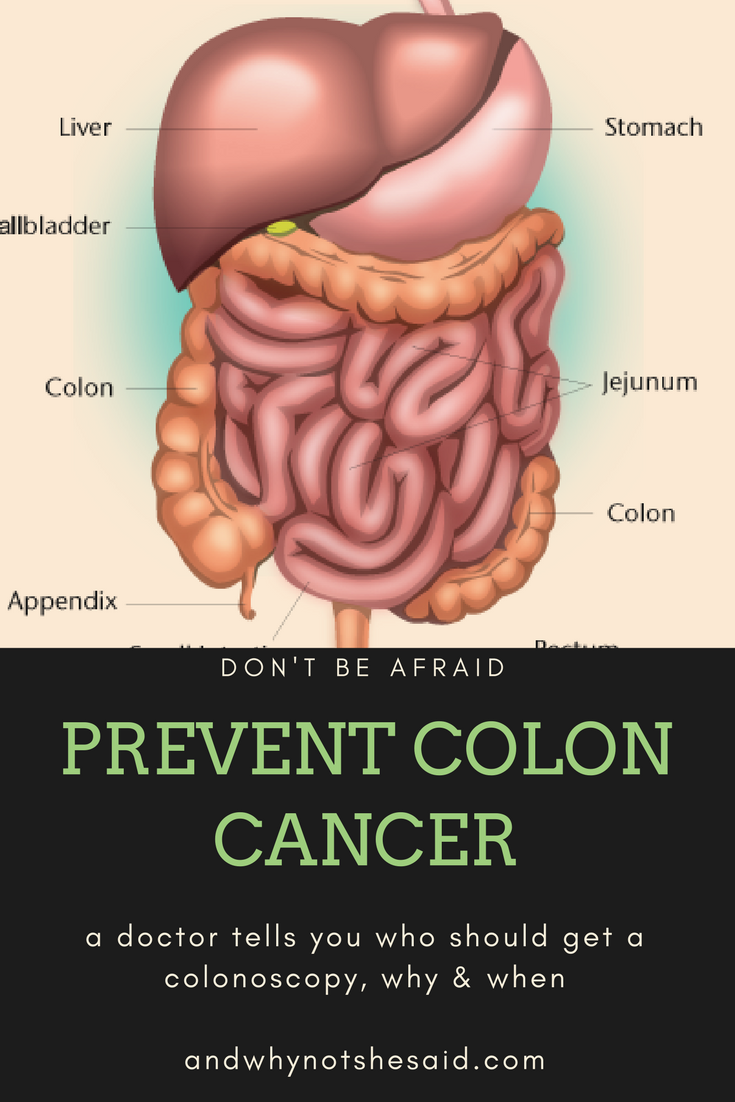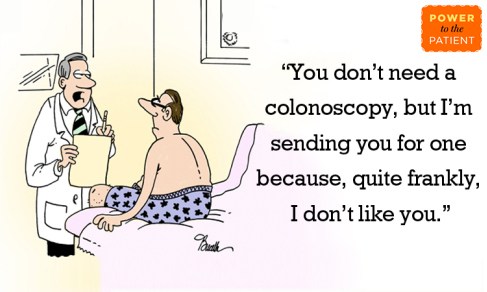
Let me stop you right there! How do you know you DON’T need a rod up your a**? Also, “rod up a**” might be a bit of an overstatement of that to which I am referring: colonoscopy.
Let’s start at the beginning.
What’s a colonoscopy?
While it will certainly go up your a**, it’s hardly a rod. It is a skinny, flexible tube, about the size of a finger (smaller than a poop!), that has a camera on the tip, and is passed rectally into the colon and advanced using little wheels and a lot of wrist action. It might sound uncomfortable, but you are sedated for the test so you really don’t feel anything; the test is cake. The unpleasant part is the prep you have to do before hand: a drink you take the night before and sometimes the morning of your procedure, which will flush you out, and by that I mean give you profuse diarrhea. If you have brown eyes, they might turn blue. And that’s, obviously, so that when the camera goes in, it has something to look at other than poop.
WHY would I want to do all that?
Well, that depends. Colonoscopies are done for two general reasons, diagnostic and screening/surveillance.
- Diagnostic colonoscopy
- This means you’re having a problem (like bleeding, or diarrhea) and the doctor is doing it to diagnose the problem
- Diagnostic colonoscopy can be done at any age because you can develop a problem at any age
- Follow up is determined by the nature of the problem you’re having
- Sometimes, insurances charge a copay for this type of procedure
- Screening colonoscopy
- This means you’re NOT having a problem, and the doctor is doing the test for colon cancer prevention
- Screening is recommended to start at age 50 without family history of colon cancer, and maybe earlier if there is
- Follow up is determined by the findings and the history
- 10 years without family history of colon cancer and a normal colon
- 5 years if there is a family history or 2 or less small polyps
- 3 years if there are 3 or more polyps or if a polyp is very large
- or, if it is a high risk polyp, or partially removed, the doctor might ask you to repeat even sooner
- Obamacare guaranteed no copays for this type of preventive screening procedures, but who knows what’s gonna happen in the future, amirite!
- If there is a very unusually strong history in the family, the doctor might suspect a genetic syndrome and determine a different schedule for your screening, or even ask for a consultation from genetic counseling
How in the world does a rod up my a** prevent colon cancer? Also, what’s a polick?
The word is “polyp.” And allow me to explain.
So, the lining of the colon regenerates at a rapid rate, and as it does, with time, you start losing some genetic material, so the tissue starts making mistakes. As a result, you get these little growths off the side of the colon, called “polyps.” They don’t start out cancerous, but as tissue continues to regenerate and more genetic material gets warped (or “mutated”), they could start to get closer and closer, and eventually become a cancer. IF we can take them out while they’re small, we prevent cancer that way! Easy peasy! You have no idea how many times a person will come for their first colonoscopy at age 70 and I find a mass (nice word for cancer). That mass would have been a small polyp twenty years prior if the person had gotten their procedure.
I dunno, sounds dangerous
Well, no procedure is risk free. Colonoscopy is very routine and safe, but there are some risks. About 1 out of every 100-300 cases ends up with a bleed afterwards that we have to go back in and fix. The risk is especially high when/if a polyp was removed. And, even more rare, about 1 person out of every 1000-3000 gets a tear in the colon wall. That’s called a “perforation” and it usually results in surgery to fix it. Most healthy people do well.
Does my butt hurt after?
Ummm no. The scope is tiny compared to the other stuff that fits through that opening. You might feel a little bloated or crampy in your belly, and that is because we use either air or carbon dioxide to distend the colon so we can see. After your procedure is done, you will be asked to pass some gas, and that will probably be the only time it is socially acceptable to do that in front of others. You’ll even be commended.

So, I’ll see you, right?



Leave a comment